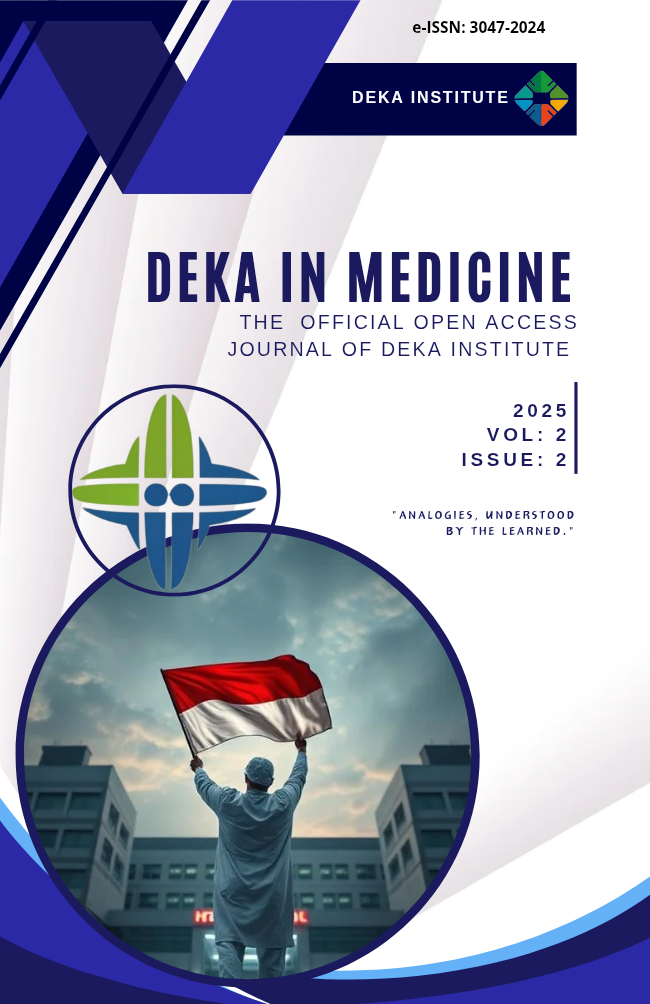Compartment syndrome as reperfusion injury following thrombectomy in acute limb ischemia: A case report
DOI:
https://doi.org/10.69863/dim.2024.e209Keywords:
Reperfusion Injury, Acute limb ischemia, thrombectomy, compartment syndrome, fasciotomyAbstract
BACKGROUND: Compartment syndrome following reperfusion in acute limb ischemia represents a rare but serious complication. Thus, documenting such cases is essential to enhance comprehension and management of this condition.
CASE PRESENTATION: A 51-year-old man was referred from an urban hospital presenting with severe right leg pain persisting for 5 days prior to admission, accompanied by pulselessness, paresthesia, poikilothermia, and paralysis. The patient had underlying risk factors including uncontrolled diabetes mellitus and active smoking. Duplex ultrasound confirmed the diagnosis of acute limb ischemia, which was further supported by CT angiography revealing total occlusion from the right common iliac artery to the distal region. Intravenous heparin was administered, and the patient underwent emergency surgical thrombectomy. Following the intervention, the patient developed clinical signs of compartment syndrome as a manifestation of reperfusion injury, necessitating fasciotomy. Subsequent evaluation of the wound post-fasciotomy indicated it was not suitable for closure, and unfortunately, the patient passed away a few days later.
CONCLUSION: This case illustrates acute limb ischemia necessitating thrombectomy and surgical fasciotomy due to compartment syndrome resulting from reperfusion injury, emphasizing the importance of rigorous monitoring.
References
Norgren L, Hiatt WR, Dormandy JA, et al. Inter-society consensus for the management of peripheral arterial disease (tasc ii). J Vasc Surg 2007;45 Suppl S(1):S5-S67.doi: 10.1016/j.jvs.2006.12.037. PMID: 17223489
Qaarie MY. Life expectancy and mortality after lower extremity amputation: Overview and analysis of literature. Cureus 2023;15(5):e38944.doi: 10.7759/cureus.38944. PMID: 37309338
Olinic DM, Stanek A, Tataru DA, et al. Acute limb ischemia: An update on diagnosis and management. J Clin Med 2019;8(8):1215.doi: 10.3390/jcm8081215. PMID: 31416204
Yeon J, Jung YW, Yang SS, et al. Lower limb compartment syndrome by reperfusion injury after treatment of arterial thrombosis post-laparoscopic radical hysterectomy and pelvic lymph node dissection for cervical cancer. Obstet Gynecol Sci 2017;60(2):223-226.doi: 10.5468/ogs.2017.60.2.223. PMID: 28344966
Novak M, Penhaker M, Raska P, et al. Extremity compartment syndrome: A review with a focus on non-invasive methods of diagnosis. Front Bioeng Biotechnol 2022;10(1):801586.doi: 10.3389/fbioe.2022.801586. PMID: 35923576
Via AG, Oliva F, Spoliti M, et al. Acute compartment syndrome. Muscles Ligaments Tendons J 2015;5(1):18-22.doi. PMID: 25878982
Orrapin S, Orrapin S, Arwon S, et al. Predictive factors for post-ischemic compartment syndrome in non-traumatic acute limb ischemia in a lower extremity. Ann Vasc Dis 2017;10(4):378-385.doi: 10.3400/avd.oa.17-00055. PMID: 29515699
Cone J, Inaba K. Lower extremity compartment syndrome. Trauma Surg Acute Care Open 2017;2(1):e000094.doi: 10.1136/tsaco-2017-000094. PMID: 29766095
Zhang DZ, Tan TH, Wong KPL, et al. Reperfusion injury with compartment syndrome following systemic thrombolysis for cardiac catheterization-related arterial thrombosis in an infant. J Pediatr Intensive Care 2020;9(1):74-76.doi: 10.1055/s-0039-1700522. PMID: 31984163
Kerkar AP, Farber A, Kalish JA, et al. Recurrent lower-extremity compartment syndrome after four-compartment fasciotomy secondary to acute limb ischemia. Ann Vasc Surg 2016;30(1):306.doi: 10.1016/j.avsg.2015.06.092. PMID: 26363426
Bekmez S, Beken S, Mermerkaya MU, et al. Acute forearm compartment syndrome in a newborn caused by reperfusion after spontaneous axillary artery thrombosis. J Pediatr Orthop B 2015;24(6):552-555.doi: 10.1097/BPB.0000000000000216. PMID: 26237661
Guo J, Yin Y, Jin L, et al. Acute compartment syndrome: Cause, diagnosis, and new viewpoint. Medicine (Baltimore) 2019;98(27):e16260.doi: 10.1097/MD.0000000000016260. PMID: 31277147
Bjorck M, Earnshaw JJ, Acosta S, et al. Editor's choice - european society for vascular surgery (esvs) 2020 clinical practice guidelines on the management of acute limb ischaemia. Eur J Vasc Endovasc Surg 2020;59(2):173-218.doi: 10.1016/j.ejvs.2019.09.006. PMID: 31899099
Acosta S, Kulezic A, Zarrouk M, et al. Management of acute lower limb ischemia without surgical revascularization - a population-based study. Vasc Endovascular Surg 2024;58(3):316-325.doi: 10.1177/15385744231215552. PMID: 37941090
Karonen E, Wrede A, Acosta S. Risk factors for fasciotomy after revascularization for acute lower limb ischaemia. Front Surg 2021;8(1):662744.doi: 10.3389/fsurg.2021.662744. PMID: 33855045
Olivia G, Petter L, Hakan P. Acute compartment syndrome following thrombolysis for acute lower limb ischemia. Ann Vasc Surg 2022;79(1):182-190.doi: 10.1016/j.avsg.2021.07.015. PMID: 34644632
Donaldson J, Haddad B, Khan WS. The pathophysiology, diagnosis and current management of acute compartment syndrome. Open Orthop J 2014;8(1):185-193.doi: 10.2174/1874325001408010185. PMID: 25067973
Downloads
Published
How to Cite
Issue
Section
License
Copyright (c) 2024 Mokhammad Afifuddin, Novi Kurnianingsih, Dea Arie Kurniawan

This work is licensed under a Creative Commons Attribution-ShareAlike 4.0 International License.

























